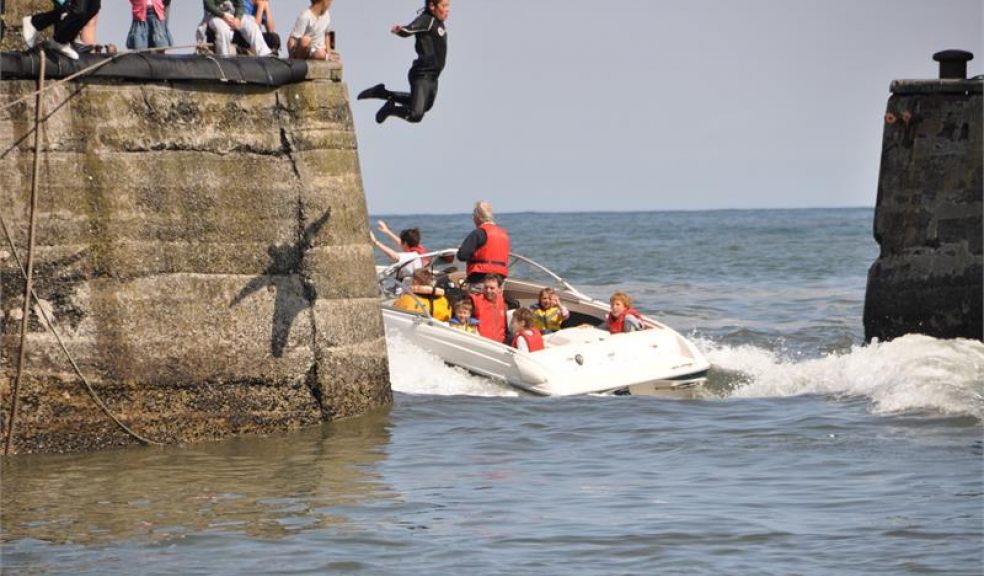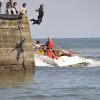
Emergency services launch lifesaving campaign
With tens of thousands of holidaymakers due to descend on us over the next few weeks, the emergency services have united in a campaign aimed at keeping everyone safe on the coast.
#Coastsafe brings together safety messages issued by organisations including Devon and Cornwall Police, the RNLI, HM Coastguard, Cornwall Fire and Rescue Service and Cornwall Air Ambulance. It builds on work done in previous years when a training pack was produced for schools by Newquay Cllr Geoff Brown and his wife Chris, under the name CoastSafe, to raise awareness about sea safety around the coast. Go to http://www.cornwall.gov.uk/community-and-living/newquay-safe/newquay-saf.... With the same aims #CoastSafe is an awareness campaign aimed at reducing harm on our coastlines.
Truro-based PC Andy Mulhern and his colleagues from partner organisations have already been busy on social media promoting a range of initiatives on #coastsafe including the RNLI’s Respect the Water. Devon and Cornwall Police website now offers a range of safety information from organisations including the RNLI, the Royal Life Saving Society, ROSPA and Cornwall Council giving advice on cliff walking and tombstoning, rip currents and tides, falling in the water and beach safety
PC Mulhern said: “The coast is a great place to be in the summer months but it can also be dangerous when people do not understand the hazards or know what to do if they get into trouble.”
Rip currents have been responsible for the deaths of dozens of swimmers and surfers over recent years. One person who is only too aware of the dangers is Jo Holloway who works at police HQ. She tells her story:
“It was a hot sunny day and I was desperate to get to the beach after work to get in the water for a surf. I arrived after the lifeguards had finished for the day. As the water was still full of people on their boards I felt I was safe among the crowd so I thought nothing of getting in, especially as I was with my brother but I quickly got separated from him.
“After about an hour in the water the waves started to go a bit flat so I decided to paddle back in and try and spot my brother among all the other bobbing grey wetsuits waiting for a wave. I was paddling hard but found I wasn’t get any closer to shore, in fact no matter how hard I paddled I was getting further away. I sat up on my board and dangled my legs in the water to catch my breath and immediately my legs were swept back up out of the water by the strong current. It was at that point I realised I was in a rip and I was being dragged out and in the direction of some dangerous rocks.
“I consider myself to be very lucky because, when I was just starting to panic and forget everything I knew about the sea, another surfer saw me and shouted at me to swim parallel to the shore. So I did and I got out of the rip and then managed to paddle back into shore. By the time I got there I was so exhausted I couldn’t walk back to the car, I had to lie down on the beach. I’ve never been back to that beach through both fear and embarrassment. I wasn’t an inexperienced surfer, I have grown up around the water my entire life and know about water safety, but on that day the sea got the better of me.”
The website – www.devon-cornwall.police.uk/advice/coastsafe is being promoted by a social media campaign and posters which have been distributed around holiday cottages, campsites and St Austell Brewery’s coastal pubs. The twitter account is https://twitter.com/CoastSafe_DandC
Steve Instance, RNLI Community Safety Partner said: “Respect the Water is the RNLI’s national drowning prevention campaign, now in its fourth year. The campaign is targeted at adult men, although the advice is relevant to anyone who goes near the water. The campaign aims to highlight the dangers of sudden immersion in cold water, which can put people at severe risk of suffering cold water shock, triggering the instinctive but life-threatening reaction to gasp uncontrollably and swim hard, which can quickly lead to drowning.
“Anyone who finds themselves unexpectedly in the water should fight your instincts and remember one core survival skill – floating, until the effects of cold water shock pass and you can catch your breath, before then trying to swim to safety or call for help.
“For those who are planning to go into the water, the best way to stay safe is to choose a lifeguarded beach and swim between the red and yellow flags, which is the area most closely monitored by the lifeguards. And if you see someone else in danger in the water, fight your instinct to go in and try to rescue them yourself – instead call 999 and ask for the Coastguard.”

















